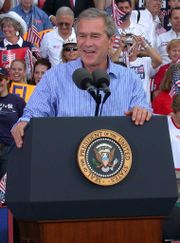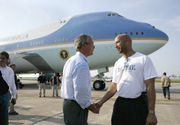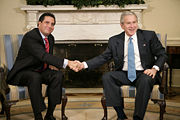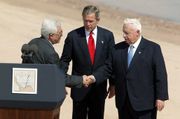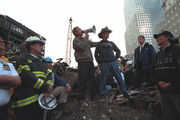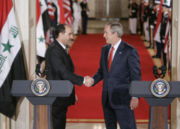George W. Bush
2008/9 Schools Wikipedia Selection. Related subjects: USA Presidents
| George Walker Bush | |
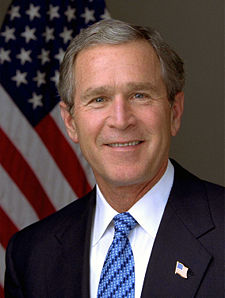 |
|
|
|
|
|---|---|
| Incumbent | |
| Assumed office January 20, 2001 |
|
| Vice President | Dick Cheney |
| Preceded by | Bill Clinton |
| Succeeded by | 44th President |
|
46th Governor of Texas
|
|
| In office January 17, 1995 – December 21, 2000 |
|
| Lieutenant | Bob Bullock Rick Perry |
| Preceded by | Ann Richards |
| Succeeded by | Rick Perry |
|
|
|
| Born | July 6, 1946 New Haven, Connecticut, United States |
| Political party | Republican |
| Spouse | Laura Bush |
| Residence | White House (official) Crawford, Texas (private) |
| Alma mater | Yale University Harvard Business School |
| Occupation | Businessman ( oil, baseball) |
| Religion | United Methodist |
| Signature |  |
George Walker Bush (born July 6, 1946) is the forty-third and current President of the United States of America who was first inaugurated on January 20, 2001. He previously served as the forty-sixth Governor of Texas from 1995 to 2000 and is the eldest son of former United States President George Herbert Walker Bush. President Bush's current term is scheduled to end on January 20, 2009.
After graduating from college, Bush worked in his family's oil businesses before making an unsuccessful run for the U.S. House of Representatives in 1978. He later co-owned the Texas Rangers baseball team before returning to politics in a campaign for Governor of Texas. He defeated Ann Richards and was elected Governor of Texas in 1994. Bush was elected to the Presidency in 2000 as the Republican candidate in a close and controversial contest, in which he lost the nationwide popular vote, but won the electoral vote.
As president, Bush signed into law a US$1.35 trillion tax cut program in 2001, and in 2002 the No Child Left Behind Act. In October 2001, after the attacks on September 11, 2001, Bush announced a global War on Terrorism and ordered an invasion of Afghanistan to overthrow the Taliban, destroy Al-Qaeda, and to capture Osama bin Laden. In March 2003, Bush ordered the invasion of Iraq, asserting that Iraq was in possession of weapons of mass destruction and that the war was necessary for the protection of the United States.
Running in the midst of the Iraq War, Bush was re-elected on November 2, 2004; his presidential campaign against Senator John Kerry was successful despite controversy over Bush's prosecution of the Iraq War and domestic issues. After his re-election, Bush received increasingly heated criticism. He has the distinction of having some of the highest and lowest approval ratings of any president in history during his term. His domestic approval has ranged from 90 percent (the highest ever recorded by The Gallup Organization) immediately after the September 11, 2001 attacks to a low of 24 percent, with a disapproval rating of 65 percent, the highest level of disfavor for any sitting presidents since Richard Nixon and Harry Truman. Internationally, Bush tops the list of the most unpopular politicians, with disapproval of 87% in France and Germany, and 88% in Spain.
Childhood to mid-life
Born in New Haven, Connecticut on July 6, 1946, Bush was the first child of George H. W. Bush and Barbara Bush (née Pierce). Bush was raised in Midland and Houston, Texas, with his four siblings, Jeb, Neil, Marvin, and Dorothy. Another younger sister, Robin, died in 1953 at the age of three from leukemia. Bush's grandfather, Prescott Bush, was a U.S. Senator from Connecticut, and his father served as U.S. President from 1989 to 1993.
Bush attended Phillips Academy in Andover, Massachusetts, where he played baseball, and was the head cheerleader at the all-boys school during his senior year. Following in his father's footsteps, Bush attended Yale University, where he received a Bachelor's degree in history in 1968. As a college senior, Bush became a member of the secretive Skull and Bones society. By his own characterization, Bush was an average student.
In May 1968, at the height of the ongoing Vietnam War, Bush was accepted into the Texas Air National Guard despite only scoring in the 25th percentile on the pilot's written aptitude test, which was the lowest acceptable passing grade. This was at a time when more than ten thousand Air National Guard personnel, many fighter pilots, had been called to active duty to serve both in Vietnam, and in support of operations there. After training, he was assigned to duty in Houston, flying Convair F-102s out of Ellington Air Force Base. Critics have alleged that Bush was favorably treated during his time of service due to his father's political standing and that he was irregular in attendance. The United States Department of Defense has released all of the records of Bush's Texas Air National Guard service which it says remain in its official archives. In 1970 Bush applied to the University of Texas School of Law and was rejected. Bush took a transfer to the Alabama Air National Guard in 1972 to work on a Republican senate campaign, and in October 1973 he was discharged from the Texas Air National Guard almost eight months early to attend Harvard Business School and completed his six-year service obligation in the inactive reserve.
There are a number of accounts of substance abuse and otherwise disorderly conduct by Bush from this time. Bush has admitted to drinking "too much" in those years and described this period of his life as his "nomadic" period of "irresponsible youth". On September 4, 1976, at the age of 30, Bush was arrested for driving under the influence of alcohol ( DUI) near his family's summer home in Kennebunkport, Maine. He pled guilty, was fined US$150, and had his driver's license suspended in Maine until 1978.
After obtaining an MBA from Harvard University, Bush entered the oil industry in Texas. In 1977, he was introduced by friends to Laura Welch, a schoolteacher and librarian. They married and settled in Midland, Texas. Bush left his family's Episcopal Church to join his wife's United Methodist Church.
In 1978, Bush ran for the U.S. House of Representatives from the 19th Congressional District of Texas. His opponent Kent Hance portrayed Bush as being out of touch with rural Texans; Bush lost by 6,000 votes. Bush returned to the oil industry, becoming a senior partner or chief executive officer of several ventures, such as Arbusto Energy, Spectrum 7, and, later, Harken Energy. These ventures suffered from the general decline of oil prices in the 1980s that had affected the industry and the regional economy. Additionally, questions of possible insider trading involving Harken have arisen, though the Securities and Exchange Commission's (SEC) investigation of Bush concluded that he did not have enough insider information before his stock sale to warrant a case.
Bush moved with his family to Washington, D.C., in 1988, to work on his father's campaign for the U.S. presidency. Returning to Texas after the campaign, Bush purchased a share in the Texas Rangers baseball franchise in April 1989, where he served as managing general partner for five years. Bush actively led the team's projects and regularly attended its games, often choosing to sit in the open stands with fans. The sale of Bush's shares in the Rangers in 1998 brought him over US$15 million from his initial US$800,000 investment.
Elected positions
Governor of Texas
Bush declared his candidacy for the 1994 Texas gubernatorial election as his brother, Jeb, sought the governorship of Florida. Winning the Republican primary easily, Bush faced incumbent Governor Ann Richards, a popular Democrat who was considered the favorite.
Bush was aided by several political advisers, including Karen Hughes, Joe Allbaugh, and Karl Rove. The Bush campaign was criticized for allegedly using controversial methods to disparage Richards. Following an impressive performance in the debates, however, Bush's popularity grew. He won with 52 percent against Richards' 47 percent.
As governor, Bush successfully sponsored legislation for tort reform, increased education funding, set higher standards for schools, and reformed the criminal justice system. Under his leadership, Texas executed a record 152 prisoners. Bush used a budget surplus to push through a $2 billion tax-cut plan, the largest in Texas history, which cemented Bush's credentials as a pro-business fiscal conservative.
Bush also pioneered faith-based welfare programs by extending government funding and support for religious organizations that provide social services such as education, alcohol and drug abuse prevention, and reduction of domestic violence. He proclaimed June 10 to be Jesus Day in Texas, a day where he "urge[d] all Texans to answer the call to serve those in need."
In 1998, Bush won re-election in a landslide victory with nearly 69 percent of the vote. Within a year, he had decided to seek the Republican nomination for the presidency.
2000 Presidential candidacy
Primary
Bush's campaign was managed by Rove, Hughes and Allbaugh, as well as by other political associates from Texas. He was endorsed by a majority of Republicans in 38 state legislatures. After winning the Iowa caucus, Bush lost to U.S. Senator John McCain of Arizona in the New Hampshire primary. Bush then picked up eleven of the next sixteen primaries, effectively clinching the Republican nomination.
In the televised Republican presidential debate held in Des Moines, Iowa on December 13, 1999, all of the participating candidates were asked "What political philosopher or thinker do you most identify with and why?" Unlike most of the other candidates, who cited former presidents and other political figures, Bush responded, "Christ, because he changed my heart". Bush's appeal to religious values seems to have aided him in the general election. In a Gallup poll those who said they "attend church weekly" gave him 56% of their vote in 2000, and 63% of their vote in 2004. During the election cycle, Bush labeled himself a " compassionate conservative", and his political campaign promised to "restore honour and dignity to the White House," a reference to the scandals and impeachment of his predecessor.
General election
On July 25, 2000, Bush surprised some observers by asking Halliburton Corporation chief executive officer Dick Cheney, a former White House Chief of Staff, U.S. Representative and Secretary of Defense, to be his Vice Presidential running mate. Cheney was then serving as head of Bush's Vice-Presidential search committee.
While stressing his successful record as governor of Texas, Bush's campaign criticized the Democratic nominee, incumbent Vice President Al Gore, over gun control and taxation.
Bush won the 2000 election in a controversial victory that saw the state of Florida appearing in exit polls to go to Gore, then to Bush. The closeness of the outcome, as well as reports of votes being miscounted, led to the Florida election recount. Two initial counts went to Bush, but that outcome was tied up in courts for a month until reaching the U.S. Supreme Court. On December 9, in the Bush v. Gore case, the Court reversed a Florida Supreme Court ruling ordering a third count, and stopped an ordered statewide hand recount based on the argument that the different standards that different counting procedures would have used violated the Equal Protection Clause of the 14th Amendment of the U.S. Constitution. The machine recount stated that Bush had won the Florida vote by a margin of 537 votes out of 6 million cast. The famous episode pushed terms such as hanging chad into the popular lexicon.
Bush received 271 electoral votes to Gore's 266 as a result of the Florida outcome. However, he lost the popular vote by more than half a million votes making him the first president elected without at least a plurality of the popular vote since Benjamin Harrison in 1888.
2004 Presidential candidacy
Bush commanded broad support in the Republican Party and did not encounter a primary challenge. He appointed Kenneth Mehlman as campaign manager, with a political strategy devised by Rove. Bush outlined an agenda that included a strong commitment to the wars in Iraq and Afghanistan, a renewal of the USA PATRIOT Act, making earlier tax cuts permanent, cutting the budget deficit in half, promoting education, as well as reform in tort law, reforming Social Security, and creation of an ownership society.
The Bush campaign advertised across the U.S. against Democratic candidates, including Bush's emerging opponent, Massachusetts Senator John Kerry. Kerry and other Democrats attacked Bush on the war in Iraq, perceived excesses of the USA PATRIOT Act and for allegedly failing to stimulate the economy and job growth. The Bush campaign portrayed Kerry as a staunch liberal who would raise taxes and increase the size of government. The Bush campaign continuously criticized Kerry's seemingly contradictory statements on the war in Iraq, and claimed Kerry lacked the decisiveness and vision necessary for success in the war on terrorism. Bush carried 31 of 50 states for a total of 286 Electoral College votes.
Bush won an outright majority of the popular vote, the first president to do so since his father in 1988. In addition, Bush's re-election occurring along with the Republican Party maintaining its majorities in both houses of Congress was the first time this instance occurred since Calvin Coolidge's election in 1924.
Presidency
| The Bush Cabinet | ||
|---|---|---|
| OFFICE | NAME | TERM |
| President | George W. Bush | 2001 – present |
| Vice President | Dick Cheney | 2001 – present |
| Secretary of State | Colin Powell | 2001 – 2005 |
| Condoleezza Rice | 2005 – present | |
| Secretary of Treasury | Paul O'Neill | 2001 – 2002 |
| John Snow | 2003 – 2006 | |
| Henry Paulson | 2006 – present | |
| Secretary of Defense | Donald Rumsfeld | 2001 – 2006 |
| Robert Gates | 2006 – present | |
| Attorney General | John Ashcroft | 2001 – 2005 |
| Alberto Gonzales | 2005 – 2007 | |
| Michael Mukasey | 2007 – present | |
| Secretary of the Interior | Gale Norton | 2001 – 2006 |
| Dirk Kempthorne | 2006 – present | |
| Secretary of Agriculture | Ann Veneman | 2001 – 2005 |
| Mike Johanns | 2005 – 2007 | |
| Ed Schafer | 2008 – present | |
| Secretary of Commerce | Donald Evans | 2001 – 2005 |
| Carlos Gutierrez | 2005 – present | |
| Secretary of Labor | Elaine Chao | 2001 – present |
| Secretary of Health and Human Services |
Tommy Thompson | 2001 – 2005 |
| Michael Leavitt | 2005 – present | |
| Secretary of Education | Rod Paige | 2001 – 2005 |
| Margaret Spellings | 2005 – present | |
| Secretary of Housing and Urban Development |
Mel Martinez | 2001 – 2003 |
| Alphonso Jackson | 2003 – 2008 | |
| Steve Preston | 2008 – present | |
| Secretary of Transportation | Norman Mineta | 2001 – 2006 |
| Mary Peters | 2006 – present | |
| Secretary of Energy | Spencer Abraham | 2001 – 2005 |
| Samuel Bodman | 2005 – present | |
| Secretary of Veterans Affairs | Anthony Principi | 2001 – 2005 |
| Jim Nicholson | 2005 – 2007 | |
| James Peake | 2007 – present | |
| Secretary of Homeland Security | Tom Ridge | 2003 – 2005 |
| Michael Chertoff | 2005 – present | |
| Chief of Staff | Andrew Card | 2001 – 2006 |
| Joshua Bolten | 2006 – present | |
| Administrator of the Environmental Protection Agency |
Christine Todd Whitman | 2001 – 2003 |
| Michael Leavitt | 2003 – 2005 | |
| Stephen Johnson | 2005 – present | |
| Director of the Office of Management and Budget |
Mitch Daniels | 2001 – 2003 |
| Joshua Bolten | 2003 – 2006 | |
| Rob Portman | 2006 – 2007 | |
| Jim Nussle | 2007 – present | |
| Director of the Office of National Drug Control Policy |
John Walters | 2001 – present |
| United States Trade Representative | Robert Zoellick | 2001 – 2005 |
| Rob Portman | 2005 – 2006 | |
| Susan Schwab | 2006 – present | |
Economic policy
Facing opposition in Congress, Bush held town hall-style public meetings across the U.S. in 2001 to increase public support for his plan for a US$1.35 trillion tax cut program—one of the largest tax cuts in U.S. history. Bush and his economic advisers argued that unspent government funds should be returned to taxpayers. With reports of the threat of recession from Federal Reserve Chairman Alan Greenspan, Bush argued that such a tax cut would stimulate the economy and create jobs. Others, including the Treasury Secretary at the time Paul O'Neill, were opposed to some of the tax cuts on the basis that they would contribute to budget deficits and undermine Social Security.
Under the Bush Administration, Real GDP has grown at an average annual rate of 2.5 percent, considerably below the average for business cycles from 1949 to 2000. The Dow Jones Industrial Average has grown by about 30 percent since January 2001. Unemployment rose from 4.2 percent in January 2001 to 6.3 percent in June 2003, dropping to 4.5 percent as of July 2007. The on-budget deficit for 2006 was US$434 billion, a change from an US$86 billion surplus in 2000. Inflation-adjusted median household income has been flat while the nation's poverty rate has increased. By August 23, 2007, the national debt had officially risen to US$8.98 trillion dollars; the national debt has increased US$3.25 trillion dollars since Bush took office.
While some argue that the Bush-era economy has mostly benefited the wealthy and not the majority of middle and lower-class citizens, and still others have claimed the exact opposite; information available suggests that the standard of living has increased on all rungs of the socio-economic strata -- with the bulk of income gains having gone to the top 1 percent, whose share of income has increased substantially.
Another significant part of the Bush economic plan was the Bankruptcy Abuse Prevention and Consumer Protection Act of 2005.
Education and health
The No Child Left Behind Act aimed to measure and close the gap between rich and poor student performance, provide options to parents with students in low-performing schools, and target more federal funding to low-income schools. Critics argue that Bush has underfunded his own program, and Democratic Senator Ted Kennedy has claimed: "The tragedy is that these long-overdue reforms are finally in place, but the funds are not." Many educational experts have criticized these reforms, contending that NCLBA's focus on "high stakes testing" and quantitative outcomes is counterproductive. Bush increased funding for the National Science Foundation and National Institutes of Health in his first years of office, and created education programs to strengthen the grounding in science and mathematics for American high school students. However, funding for NIH failed to keep up with inflation in 2004 and 2005, and was actually cut in 2006, the first such cut in 36 years.
In 2007, Bush opposed and vetoed State Children's Health Insurance Program (SCHIP) legislation which was tied by the Democrats onto a war funding bill and passed by Congress. The SCHIP legislation would have significantly expanded federally-funded health care benefits and plans to children of some low-income families from about 6 million to 10 million children. It was to be funded by an increase in the cigarette tax. Bush viewed the legislation as a move toward the liberal platform of socialized health care, and claimed that the program could benefit families making as much as US$83,000 per year who would not have otherwise needed the help.
Social services and Social Security
Bush promoted increased deregulation and investment options in social services, leading Republican efforts to pass the Medicare Act of 2003, which added prescription drug coverage to Medicare and created Health Savings Accounts, which would permit people to set aside a portion of their Medicare tax to build a "nest egg". The retired persons lobby group AARP worked with the Bush Administration on the program and gave their endorsement. Bush said the law, estimated to cost US$400 billion over the first 10 years, would give the elderly "better choices and more control over their health care".
Bush began his second term by outlining a major initiative to reform Social Security, which was facing record deficit projections beginning in 2005. Bush made it the centerpiece of his agenda despite contrary beliefs in the media and in the U.S. Congress, which saw the program as the " third rail of politics," with the American public being suspicious of any attempt to change it. It was also widely believed to be the province of the Democratic Party, with Republicans in the past having been accused of efforts to dismantle or privatize it. In his 2005 State of the Union address, Bush discussed the allegedly impending bankruptcy of the program and attacked political inertia against reform. He proposed options to permit Americans to divert a portion of their Social Security tax (FICA) into secured investments, creating a "nest egg" that he claimed would enjoy steady growth. Despite emphasizing safeguards and remaining open to other plans, Bush's proposal was criticized for its high cost, and Democrats attacked it as an effort to partially privatize the system, and for leaving Americans open to the whims of the market. Bush embarked on a 60-day national tour, campaigning vigorously for his initiative in media events ("Conversations on Social Security") in a largely unsuccessful attempt to gain support from the general public. Despite energetic campaign by Bush to promote his Social Security reform plan, by May 2005 the public support for the Bush proposal declined substantially and the House GOP leadership decided not to put Social Security reform on the priority list for the remainder of their 2005 legislative agenda. The proposal's legislative prospects were further diminished by the political fallout from the Hurricane Katrina in the fall of 2005. In the run-up to the 2006 congressional elections, the Republican leadership in Congress put the hot-button issue of the Social Security reform on the back burner. No substantive legislative action was taken on this issue in 2006. After the Democrats took over control of both houses of Congress as a result of the 2006 mid-term elections, the prospects of any further congressional action on the Bush proposal appeared to be dead for the remainder of his term in office.
Environmental policy and global warming
Upon arriving in office in 2001, Bush did not support the Kyoto Protocol, an amendment to the United Nations Convention on Climate Change which seeks to impose mandatory targets for reducing greenhouse gas emissions. Bush partially based this decision on the fact that the Senate had voted 95–0 in 1997 on a resolution expressing its disapproval of the protocol. Bush asserted he would not support it because the treaty exempted 80 percent of the world's population and would have cost the economy tens of billions of dollars per year, and was based on the uncertain science of climate change. The Bush Administration's stance on global warming has remained controversial in the scientific and environmental communities during his presidency.
In 2004, the Director of NASA's Goddard Institute, James Hansen, publicly and harshly accused the Administration of misinforming the public by suppressing the scientific evidence of the dangers of greenhouse gases, saying the Bush Administration wanted to hear only scientific results that “fit predetermined, inflexible positions” and edited reports to make the dangers sound less threatening in what he asserted was "direct opposition to the most fundamental precepts of science." Other experts, such as former United States Department of Energy official Joseph Romm, have decried the Bush administration as a "denier and delayer" of government action essential to reduce carbon emissions and deter global warming. Bush had said that he has consistently noted that global warming is a serious problem, but asserted there is a "debate over whether it's manmade or naturally caused". In his 2007 State of the Union Address, Bush renewed his pledge to work toward diminished reliance on foreign oil by reducing fossil fuel consumption and increasing alternative fuel production.
In 2002, Bush announced the Clear Skies Initiative, aimed at amending the Clean Air Act to reduce air pollution through the use of emissions trading programs. Critics contended that it would have weakened the original legislation by allowing higher levels of pollutants than were permitted at that time. The initiative was introduced to Congress, but failed to make it out of committee.
In 2006, Bush declared the Northwestern Hawaiian Islands a national monument, creating the largest marine reserve to date. It comprises 84 million acres (340,000 km²) and is home to 7,000 species of fish, birds and other marine animals, many of which are specific to only those islands. The move was hailed by conservationists for "its foresight and leadership in protecting this incredible area."
Stem cell research and first use of veto power
Federal funding for medical research involving the creation or destruction of human embryos through the Department of Health and Human Services and the National Institutes of Health has been forbidden by law since the Republican Revolution of 1995. Bush has asserted that he supports stem cell research, but only to the extent that human embryos are not destroyed in order to harvest additional stem cells. On August 9, 2001, Bush signed an executive order lifting the ban on federal funding for the 71 existing "lines" of stem cells, but the ability of these existing lines to provide an adequate medium for testing has been questioned. Testing can only be done on 12 of the original lines, and all of the approved lines have been cultured in contact with mouse cells, which makes it highly unlikely the FDA would ever approve them for administration to humans. On July 19, 2006, Bush used his veto power for the first time in his presidency to veto the Stem Cell Research Enhancement Act. The bill would have reversed the Dickey Amendment, permitting federal money to be used for research where stem cells are derived from the destruction of an embryo.
Immigration
In 2006, Bush shifted focus somewhat to re-emphasize immediate and comprehensive immigration reform. Going beyond calls from Republicans and conservatives to secure the border, Bush demanded that Congress create a "temporary guest-worker program" to allow more than 12 million illegal immigrants to obtain legal status. Bush continues to argue that the lack of legal status denies the protections of U.S. laws to millions of people who face dangers of poverty and exploitation, and penalizes employers despite a demand for immigrant labor.
Bush urged Congress to provide additional funding for border security, and committed to deploying 6,000 National Guard troops to the United States-Mexico border. In May-June 2007 Bush strongly supported the Comprehensive Immigration Reform Act of 2007 which was written by a bipartisan group of U.S. senators with the active participation of the Bush administration. The bill envisioned: a legalization program for undocumented immigrants, with an eventual path to citizenship; establishing a guest worker program; a series of border and worksite enforcement measures; a reform of the green card application process and the introduction of a point-based "merit" system for green cards; elimination of "chain migration" and of the diversity Green Card Lottery; and other measures.
A heated public debate followed, which resulted in a substantial rift within the Republican Party, with the majority of the conservative base opposing the bill because of its legalization or "amnesty" provisions. The bill was finally defeated in the Senate on June 28, 2007, when a cloture motion failed on a 46-53 vote, whereas 60 positive votes were needed for the motion to pass. Bush was very disappointed in the bill's failure that also represented a defeat of one of his signature domestic initiatives. The Bush administration later proposed a series of immigration enforcement measures that do not require a change in law.
Civil liberties and treatment of detainees
Following the events of September 11, Bush issued an executive order authorizing the NSA to monitor communications between suspected terrorists outside the U.S. and parties within the U.S. without obtaining a warrant pursuant to the Foreign Intelligence Surveillance Act, maintaining that the warrant requirements of FISA were implicitly superseded by the subsequent passage of the Authorization for Use of Military Force. The program proved to be controversial, as critics of the administration, as well as organizations such as the American Bar Association, claimed it was illegal. In August 2006, a U.S. district court judge ruled that the Terrorist Surveillance Program was unconstitutional, though the decision was later dismissed. On January 17, 2007, Attorney General Alberto Gonzales informed U.S. Senate leaders that the program would not be reauthorized by the president, but would be subjected to judicial oversight.
On October 17, 2006 Bush signed into law the Military Commissions Act of 2006, a bill passed in the wake of the Supreme Court's decision on Hamdan v. Rumsfeld, which allows the U.S. government the ability to prosecute unlawful enemy combatants by military commission rather than the standard trial. The bill also eliminates habeas corpus and, while barring torture of detainees, allows the president to determine what constitutes torture.
Hurricane Katrina
One of the worst natural disasters in U.S. history, Hurricane Katrina, struck early in Bush’s second term. Katrina formed in late August during the 2005 Atlantic hurricane season and devastated much of the north-central Gulf Coast of the United States, particularly New Orleans.
Bush declared a state of emergency in Louisiana on August 27, and in Mississippi and Alabama on August 28; he authorized the Department of Homeland Security (DHS) and Federal Emergency Management Agency (FEMA) to manage the disaster, but his announcement failed to spur these agencies to action. The eye of the hurricane made landfall on August 29, and New Orleans started to flood due to levee breaches; later that day, Bush declared that a major disaster existed in Louisiana, officially authorizing FEMA to start using federal funds to help with the recovery effort. On August 30, Department of Homeland Security secretary Michael Chertoff declared it "an incident of national significance," triggering the first use of the newly created National Response Plan. Three days later, on September 2, National Guard troops first entered the city of New Orleans. The same day, Bush toured parts of Louisiana, Mississippi, and Alabama and declared that the success of the recovery effort up to that point was "not enough."
Due to mounting criticism as the disaster in New Orleans intensified, Bush claimed full responsibility for the failures on the part of the federal government in its response to the hurricane. Criticisms of Bush focused on three main issues. First, leaders from both parties attacked the president for having appointed incompetent leaders to positions of power at FEMA, most notably Michael D. Brown, who worked for the Arabian Horse Association before commanding FEMA. Bush had praised the work of Brown just as weaknesses in the FEMA response were becoming obvious to the public. Second, many people argued that the inadequacy of the federal response was the result of the Iraq War and the demands it placed on the armed forces and the federal budget. Third, in the days immediately following the disaster, Bush denied having received warnings about the possibility of floodwaters breaching the levees protecting New Orleans. However, the presidential videoconference briefing of August 28 shows Max Mayfield warning the president that overflowing the levees was "obviously a very, very grave concern." Critics claimed that the president was misrepresenting his administration's role in what they saw as a flawed response.
Foreign policy
The Bush administration withdrew U.S. support for several international agreements, including the Anti-Ballistic Missile Treaty (ABM) with Russia. It pursued a national missile defense which was previously barred by the ABM treaty and was never ratified by Congress. Bush also expressed U.S. support for the defense of Taiwan following the stand-off in April 2001 with the People's Republic of China over the Hainan Island incident, when an EP-3E spy plane collided with a Chinese Air Force jet, leading to the detention of U.S. personnel. In 2003–2004, Bush authorized U.S. military intervention in Haiti and Liberia to protect U.S. interests.
Bush emphasized a careful approach to the conflict between Israel and the Palestinians. Bush denounced Palestine Liberation Organization leader Yasser Arafat for alleged support of violence. However, he sponsored dialogs between prime ministers Ariel Sharon and Mahmoud Abbas. Bush supported Sharon's unilateral disengagement plan, and lauded the democratic elections held in Palestine after Arafat's death.
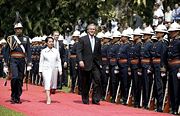
In his State of the Union Address in January 2003, Bush outlined a five-year strategy for global emergency AIDS relief, the President's Emergency Plan For AIDS Relief. Bush announced US$15 billion for this effort—US$3 billion per year for five years—but requested less in annual budgets.
Bush condemned the attacks by militia forces on the people of Darfur, and denounced the killings in Sudan as genocide. Bush said that an international peacekeeping presence was critical in Darfur, but opposed referring the situation to the International Criminal Court.
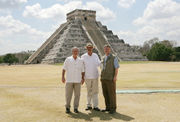
Bush began his second term with an emphasis on improving strained relations with European nations. He appointed long-time adviser Karen Hughes to oversee a global public relations campaign. Bush lauded the pro-democracy struggles in Georgia and Ukraine. In March 2006, Bush visited India, leading to renewed ties between the two countries, particularly in areas of nuclear energy and counter-terrorism cooperation. Midway through Bush's second term, many analysts observed a retreat from his freedom and democracy agenda, highlighted in policy changes toward some oil-rich former Soviet republics in central Asia.
Bush has voiced his staunch support for the independence of Kosovo. On June 10, 2007, he met with Albanian Prime Minister Sali Berisha and became the first president to visit Albania. He repeated his support for Kosovo's independence: "At some point in time, sooner rather than later, you’ve got to say, ‘Enough is enough. Kosovo is independent."
September 11, 2001
The September 11 terrorist attacks were a major turning point in Bush's presidency. That evening, he addressed the nation from the Oval Office, promising a strong response to the attacks but emphasizing the need for the nation to come together and comfort the families of the victims. On September 14, he visited the World Trade Centre site, meeting with Mayor Rudy Giuliani and firefighters, police officers, and volunteers. Bush addressed the gathering via megaphone while standing on a heap of rubble:
| “ | I can hear you. The rest of the world hears you. And the people who knocked these buildings down will hear all of us soon. | ” |
In a September 20, 2001 speech, Bush condemned Osama bin Laden and al Qaeda, and issued the Taliban regime in Afghanistan, where bin Laden was operating, an ultimatum to "hand over the terrorists, or … share in their fate." Bush announced a global War on Terrorism, and after the Afghan Taliban regime was not forthcoming with Osama bin Laden, he ordered the invasion of Afghanistan to overthrow the Taliban regime.
War on Terror
After the September 11, 2001 attacks on the United States by the al Qaeda organization of Osama bin Laden and the invasion of Afghanistan in response, Bush announced a global War on Terror in his January 29, 2002 State of the Union address and asserted that an " axis of evil" consisting of North Korea, Iran, and Iraq was "arming to threaten the peace of the world" and "pose[d] a grave and growing danger". The Bush Administration proceeded to assert a right and intention to engage in preemptive war, also called preventive war, in response to perceived threats. This would form a basis for what became known as the Bush Doctrine. The broader "War on Terror", allegations of an "axis of evil", and, in particular, the doctrine of preemptive war, began to weaken the unprecedented levels of international and domestic support for Bush and United States action against al Qaeda following the September 11 attacks.
Some national leaders alleged abuse by U.S. troops and called for the U.S. to shut down detention centers in Guantanamo Bay and elsewhere. Dissent from, and criticism of, Bush's leadership in the War on Terror increased as the war in Iraq expanded. In 2006, a National Intelligence Estimate expressed the combined opinion of the United States' own intelligence agencies, concluding that the Iraq War had become the " cause celebre for jihadists" and that jihad movement was growing.
Afghanistan
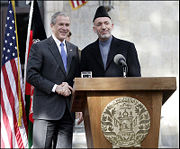
On October 7, 2001, U.S. and Australian forces initiated bombing campaigns that led to the arrival on November 13 of Northern Alliance troops in Kabul. The main goals of the war were to defeat the Taliban, drive al Qaeda out of Afghanistan, and capture key al Qaeda leaders. By December 2001, the UN had installed the Afghan Interim Authority chaired by Hamid Karzai.
Efforts to kill or capture al Qaeda leader Osama bin Laden failed as he escaped a battle in December 2001 in the mountainous region of Tora Bora, which the Bush Administration later acknowledged to have resulted from a failure to commit enough U.S. ground troops. Bin Laden and al Qaeda's number two leader, Ayman al-Zawahiri, as well as the leader of the Taliban, Mohammed Omar, remain at large as of December 2007.
Despite the initial success in driving the Taliban from power in Kabul, by early 2003 the Taliban was regrouping, amassing new funds and recruits. In 2006 the Taliban insurgency appeared larger, fiercer, and better organized than expected, with large-scale allied offensives such as Operation Mountain Thrust attaining limited success.
Iraq
Beginning with his January 29, 2002 State of the Union address, President Bush began publicly focusing attention on Iraq, which he labeled as part of an " axis of evil" allied with terrorists and posing "a grave and growing danger" to U.S. interests through possession of " weapons of mass destruction". In the latter half of 2002, Central Intelligence Agency reports requested by the administration contained conflicting assertions on whether Saddam Hussein was intent on reconstituting nuclear weapons programs, had not properly accounted for Iraqi biological and chemical weapons, and that some Iraqi missiles had a range greater than allowed by the UN sanctions. The question of whether the Bush Administration manipulated or exaggerated the threat and evidence of Iraq's weapons of mass destruction capabilities or attempted to create a tie between Saddam Hussein and al Qaeda attacks would eventually become a major point of criticism and controversy for the president. In late 2002 and early 2003, President Bush urged the United Nations to enforce Iraqi disarmament mandates, precipitating a diplomatic crisis. In November 2002, Hans Blix and Mohamed ElBaradei led UN weapons inspectors in Iraq, but were forced to depart Iraq four days prior to the U.S. invasion, despite their requests for more time to complete their tasks. The U.S. initially sought a UN Security Council resolution authorizing the use of military force but dropped the bid for UN approval due to vigorous opposition from several countries.
The war effort was joined by more than 20 other nations (most notably the United Kingdom), designated the " coalition of the willing". The invasion of Iraq commenced on March 20, 2003 and the Iraqi military was quickly defeated. Kofi Annan, Boutros Boutros-Ghali, as well as leaders of several nations made statements implying that the attack constituted a war crime. The capital, Baghdad, fell on April 9, 2003. On May 1, 2003, President Bush declared the end of major combat operations in Iraq. The initial success of U.S. operations had increased President Bush's popularity, but the U.S. and allied forces faced a growing insurgency led by sectarian groups. As the situation deteriorated, Bush's May 1, 2003 " Mission Accomplished" speech would be criticized as premature. The Bush Administration was also criticized in subsequent months following the report of the Iraq Survey Group, which did not find the large quantities of weapons that the regime was believed to possess. On December 14, 2005, Bush stated that "It is true that much of the intelligence turned out to be wrong." Bush nevertheless continued to assert the war had been worthwhile and confirmed he would have made the same decision if he had known more.
Iraqi elections and a referendum to approve a constitution were held in January and December 2005. From 2004 through 2007, the situation in Iraq deteriorated further, with some observers arguing that the country was engaged in a full scale civil war. Bush's policies regarding the war in Iraq met increasing criticism, with demands within the United States to set a timetable to withdraw troops from Iraq. In 2006 a National Intelligence Estimate asserted that the Iraq war had increased Islamic radicalism and worsened the terror threat. The 2006 report of the bipartisan Iraq Study Group led by James Baker, concluded that the situation in Iraq was "grave and deteriorating". While Bush admitted that there were strategic mistakes made in regards to the stability of Iraq, he maintained he would not change the overall Iraq strategy. On January 10, 2007 Bush addressed the U.S. about the situation in Iraq. In his speech he announced the surge of 21,500 more troops for Iraq, as well as a job program for Iraqis, more reconstruction proposals, and US$1.2 billion for these programs. On May 1, 2007, Bush used his veto for only the second time in his presidency, rejecting a congressional bill setting a deadline for the withdrawal of U.S. troops from Iraq.
North Korea
Bush publicly condemned Kim Jong-Il of North Korea, naming North Korea one of three states in an " axis of evil," and saying that "[t]he United States of America will not permit the world's most dangerous regimes to threaten us with the world's most destructive weapons." Within months, "both countries had walked away from their respective commitments under the U.S.-DPRK Agreed Framework of October 1994." North Korea's October 9, 2006 detonation of a nuclear device further complicated Bush's foreign policy, which centered for both terms of his presidency on "[preventing] the terrorists and regimes who seek chemical, biological or nuclear weapons from threatening the United States and the world." Bush condemned North Korea's claims, reaffirmed his commitment to "a nuclear-free Korean Peninsula," and stated that "transfer of nuclear weapons or material by North Korea to states or non-state entities would be considered a grave threat to the United States," for which North Korea would be held accountable. On May 7, 2007, North Korea agreed to shut down its nuclear reactors immediately pending the release of frozen funds held in a foreign bank account. This was a result of a series of three-way talks initiated by the United States and including China. On September 2, 2007, North Korea agreed to disclose and dismantle all of its nuclear programs by the end of 2007.
Assassination attempt
On May 10, 2005, while Bush was giving a speech in the Freedom Square in Tbilisi, Georgia, a live hand grenade was thrown by Vladimir Arutinian towards the podium where he and Georgian President Mikhail Saakashvili were seated. It landed in the crowd about 65 feet (20 m) from the podium after hitting a girl; it did not detonate. Arutinian was arrested in July 2005, confessed, and was convicted and given a life sentence in January 2006.
Midterm dismissal of U.S. attorneys
During Bush's second term, controversy arose over the Department of Justice's unprecedented midterm dismissal of seven United States Attorneys. The White House maintains the U.S. attorneys were fired due to performance issues. Gonzales would later resign over the issue, along with other senior members of the Justice Department. Although Congressional investigations have focused on whether the Department of Justice and the White House were using the U.S. Attorney positions for political advantage, no official findings have been released.
On November 29, 2007, Chairman of the Senate Judiciary Committee, Vermont's senior senator, the Democrat Patrick Leahy, stated that there is "significant and uncontroverted evidence that the president had no involvement in these firings." This was a reversal of Leahy's previous demands to know what, if any, role the president played, or knowledge that he had, of the firings.
Criticism and public perception
Domestic perceptions
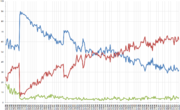
Bush began his presidency with approval ratings near 50 percent; following the September 11, 2001 attacks, Bush gained an approval rating of greater than 85 percent, maintaining 80–90 percent approval for four months after the attacks. Since then, his approval ratings and approval of his handling of domestic and foreign policy issues have steadily dropped. Bush has received heavy criticism for his handling of the Iraq War, his response to Hurricane Katrina, and to the Abu Ghraib prisoner abuse, NSA warrantless surveillance of terrorists or individuals suspected of involvement with terrorist groups, Scooter Libby, and Guantanamo Bay detainment camp controversies. Additionally, critics have decried his frequent use of signing statements, contending that they are unconstitutional. The decision of Rep. John Conyers (D-MI) the House Judiciary Chair to hold hearings on Bush’s use of “ signing statements”, has been hailed by the president’s critics as a step towards impeachment.
In the 2004 elections, 95–98 percent of the Republican electorate approved of him. This support waned, however, due mostly to Republicans' growing frustration with Bush on the issues of spending and illegal immigration. Some Republican leaders began criticizing Bush on his policies in Iraq, Iran, and the Palestinian Territories. Bush's approval rating has been below the 50 percent mark in AP-Ipsos polling since December 2004.
Polls conducted in 2006 showed an average of 37 percent approval ratings for Bush; the lowest for any second term president in this point of term since Harry Truman in March 1951, when his approval rating was 28 percent, which contributed to what Bush called the "thumping" of the GOP in the 2006 mid-term elections. In the average of major polls Bush's approval rating was, as of September 25, 2007, 33.8 percent. In a Newsweek poll of June 21, 2007, Bush received an approval rating of 26 percent, the lowest point of his presidency, and the second lowest of any president in the last thirty five years, second only to Richard Nixon's record low of 23 percent, seven months before he resigned from office.
Calls for the impeachment of Bush have been made by various groups and individuals, with their reasons usually centering on the NSA warrantless surveillance controversy, the Bush administration's justification for the war in Iraq, and violations of the Geneva Conventions. Opinion polling has shown that about half of Americans would support impeaching Bush if it was found that he had lied about the reasons for the war in Iraq. In a July 2007 poll, a plurality of registered voters favored the House of Representatives beginning impeachment proceedings against Bush. The same poll shows that a plurality of all adults oppose such actions.
Bush's intellectual capacities have been questioned by the news media, as well as other politicians. Detractors tended to cite the various linguistic errors made by Bush during his public speeches, which are colloquially known as Bushisms.
Activist and filmmaker Michael Moore released Fahrenheit 9/11 in 2004, making a plethora of accusations against Bush, most notably using public sentiments following 9/11 for political purposes, financial connections between the Bush family and the prominent Saudi Arabian families such as the royal family and the bin Laden family, and lying about the cause for war in Iraq. In 2000 and again in 2004, Time magazine named George W. Bush as its Person of the Year, a title awarded to someone who, "for better or for worse, … has done the most to influence the events of the year." In 2006, Rolling Stone magazine featured an article by historian Sean Wilentz contending Bush is one of the worst presidents in American history.
On November 14, 2007, President Bush topped the annual Film Threat Frigid 50 list of Hollywood's coldest people. President Bush was cited because of the large number of hostile film and television programs that criticized his presidency, and because of the excess number of documentaries that called his domestic and foreign policy judgments into question. "With all due respect to Hollywood, the mighty W is as much a cinema celebrity as the next despotic tyrant," said Film Threat, adding: "President George W. Bush has been a fixture on the big and small screens for the length of his historically tragic run."
Foreign perceptions

Bush has been widely criticized internationally; he was targeted by the global anti-war and anti-globalization campaigns, and criticized for his foreign policy in general. Bush's policies were also the subject of heated criticism in the 2002 elections in Germany and the 2006 elections in Canada. Bush was openly condemned by current and former international leaders such as Gerhard Schröder, Jean Chrétien, Mohammad Khatami, José Luis Rodríguez Zapatero, Romano Prodi, Paul Martin, and particularly Hugo Chávez. Later in Bush's presidency, tensions arose between himself and Vladimir Putin, which has led to a cooling of their relationship.
Bush has been described as having especially close personal relationships with Tony Blair and Vicente Fox, although formal relations are sometimes strained.
In 2006, a majority of respondents in 18 of 21 countries surveyed around the world were found to hold an unfavorable opinion of Bush. Respondents indicated that they judged his administration as "negative" for world security. A poll conducted in Britain named Bush the second biggest "threat to world peace" after bin Laden, beating North Korean leader Kim Jong-Il. According to a poll taken in November 2006, Finns also believed that Bush was the biggest "threat to world peace" after bin Laden. Kim Jong-Il came in third in the poll and Mahmoud Ahmadinejad and Hassan Nasrallah tied for fourth.
A March 2007 survey of Arab opinion conducted by Zogby International and the University of Maryland found that George W. Bush is the most disliked leader in the Arab world. More than three times as many respondents registered their dislike for Bush as for the second most unpopular leader, Ariel Sharon. According to a 2006 poll conducted by the Iraq Centre for Research and Strategic studies, a majority of Iraqis believe that the U.S. has lost its global credibility as a result of Bush's foreign policies.
The Pew Research Centre's 2007 Global Attitudes poll found that out of 47 countries, only respondents from Israel and some sub-Saharan countries expressed "a lot" or "some" confidence in George W. Bush more than 50% of the time. Of European respondents surveyed, Italy and the Czech Republic expressed 30% or greater confidence in Bush.
During a June 2007 visit to Albania Bush was greeted with a "rockstar reception" as the Albanian people cheered, shook his hands, and kissed his cheeks. A commemorative stamp was issued for the occasion. Albanian prime minister, Sali Berisha commented that Bush "was [the] greatest and most distinguished guest we have ever had in all times." Albania has troops in both Iraq and Afghanistan and the country's government is highly supportive of American foreign policy. Along with the "hero's welcome" a huge image of the President now hangs in the middle of the capital city of Tirana flanked by Albanian and American flags.
Electoral history
Republican Texas gubernatorial primary, 1994
- George W. Bush - 520,130 (93.32%)
- Ray Hollis - 37,210 (6.68%)
Texas gubernatorial election, 1994
- George W. Bush (R) - 2,350,994 (53.48%)
- Ann Richards (D) (inc.) - 2,016,928 (45.88%)
- Keary Ehlers (Lib.) - 28,320 (0.64%)
Republican Texas gubernatorial primary, 1998
- George W. Bush (inc.) - 576,528 (96.60%)
- R.C. Crawford - 20,311 (3.40%)
Texas gubernatorial election, 1998
- George W. Bush (R) (inc.) - 2,550,821 (68.24%)
- Garry Mauro (D) - 1,165,592 (31.18%)
- Lester Turlington (Lib.) - 20,711 (0.55%)
- Susan Lee Solar ( write-in) - 954 (0.03%)
United States presidential election, 2000 (Republican primaries):
- George W. Bush - 12,034,676 (62.00%)
- John McCain - 6,061,332 (31.23%)
- Alan Keyes - 985,819 (5.08%)
- Steve Forbes - 171,860 (0.89%)
- Unpledged - 61,246 (0.32%)
- Gary Bauer - 60,709 (0.31%)
- Orrin Hatch - 15,958 (0.08%)
- Al Gore (write-in) - 1,155 (0.01%)
- Bill Bradley (write-in) - 1,025 (0.01%)
United States presidential election, 2000
- George W. Bush/ Dick Cheney (R) - 50,460,110 (47.9%) and 271 electoral votes (30 states carried)
- Al Gore/ Joe Lieberman (D) - 51,003,926 (48.4%) and 266 electoral votes (20 states and D.C. carried)
- Abstaining - 1 electoral vote ( faithless elector from D.C.)
- Ralph Nader/ Winona LaDuke (Green) - 2,883,105 (2.7%)
- Pat Buchanan/ Ezola B. Foster (Reform) - 449,225 (0.4%)
- Harry Browne/ Art Olivier (Libertarian) - 384,516 (0.4%)
- Howard Phillips/ Curtis Frazier (Constitution) - 98,022 (0.1%)
- John Hagelin/ Nat Goldhaber (Natural Law) - 83,702 (0.1%)
United States presidential election, 2004
- George W. Bush/ Dick Cheney (R) (inc.) - 62,040,610 (50.7%) and 286 electoral votes (31 states carried)
- John Kerry/ John Edwards (D) - 59,028,111 (48.3%) and 251 electoral votes (19 states and D.C. carried)
- John Edwards (D) - 1 electoral vote ( faithless elector from Minnesota)


